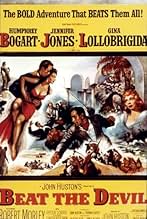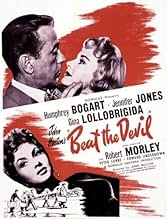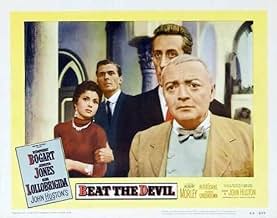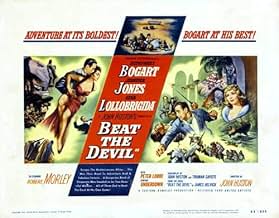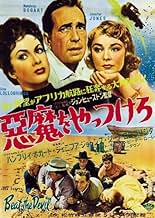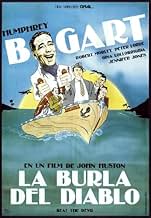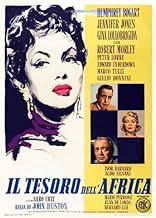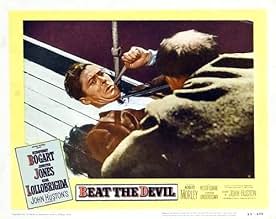IMDb RATING
6.4/10
11K
YOUR RATING
On their way to Africa are a group of rogues who hope to get rich there, and a seemingly innocent British couple. They meet and things happen...On their way to Africa are a group of rogues who hope to get rich there, and a seemingly innocent British couple. They meet and things happen...On their way to Africa are a group of rogues who hope to get rich there, and a seemingly innocent British couple. They meet and things happen...
- Awards
- 1 win total
Saro Urzì
- Captain of SS Nyanga
- (as Saro Urzi)
Alex Pochet
- Hotel Manager
- (uncredited)
Mimmo Poli
- Barman
- (uncredited)
Featured reviews
Hadn't seen this film in a long time and I'm glad to have caught it again. It's at the apex of black-and-white barely tongue-in-cheek comedies with a stellar cast that had a blast making the film.
Jennifer Jones, beautiful as always, seems barely able to stay inside her role, laughter threatening to break out at any moment. Humphrey Bogart has a recurrent quizzical "Am I really doing this?" expression.
Tied in with a gang of bumbling crooks seeking a fortune in uranium in Africa, illicitly of course, Bogart, married to a cute Gina Lollabrigida, falls in love with a faux English gentleman's wife as fast as his spouse goes for the supposed representative of the landed gentry. Of course cuddling and sweet words substitute for sex.
Robert Morley, always funny, is the putative leader of a gang that can't get their act together with Peter Lorre shedding his customary menacing stare for a busman's holiday as a gangster with a sense of humor.
The action ranges from beautiful Italy to a placid sea voyage aboard a rickety tub commanded by a rum-soaked moron whose Italian expletives are not understandable but who cares? The main characters, shipwrecked, wind up on an African shore where they're greeted by what today are embarrassingly stereotyped Arabs (I cringed at one of the European's comic invocation of Islam but then the movie has to be taken on its own terms and time, right?).
The resolution is lame - the characters all look ready to leave the set and get drunk before undertaking a new film. But this is one of the best spoofs of the noir genre and what makes it fly is the ensemble of first-rate actors in roles neatly the opposite of those they were usually seen performing.
Rent it! (Please)
Jennifer Jones, beautiful as always, seems barely able to stay inside her role, laughter threatening to break out at any moment. Humphrey Bogart has a recurrent quizzical "Am I really doing this?" expression.
Tied in with a gang of bumbling crooks seeking a fortune in uranium in Africa, illicitly of course, Bogart, married to a cute Gina Lollabrigida, falls in love with a faux English gentleman's wife as fast as his spouse goes for the supposed representative of the landed gentry. Of course cuddling and sweet words substitute for sex.
Robert Morley, always funny, is the putative leader of a gang that can't get their act together with Peter Lorre shedding his customary menacing stare for a busman's holiday as a gangster with a sense of humor.
The action ranges from beautiful Italy to a placid sea voyage aboard a rickety tub commanded by a rum-soaked moron whose Italian expletives are not understandable but who cares? The main characters, shipwrecked, wind up on an African shore where they're greeted by what today are embarrassingly stereotyped Arabs (I cringed at one of the European's comic invocation of Islam but then the movie has to be taken on its own terms and time, right?).
The resolution is lame - the characters all look ready to leave the set and get drunk before undertaking a new film. But this is one of the best spoofs of the noir genre and what makes it fly is the ensemble of first-rate actors in roles neatly the opposite of those they were usually seen performing.
Rent it! (Please)
The plot, if you can call it that, concerned a group of six stranded adventurers in an Italian port whose plan is to buy up some East African land that supposed1y contains uranium
Double-crossing quickly becomes the name of the game as Bogart and his fellow conspirators (including Robert Morley, Peter Lorre, Gina Lollobrigida, and a seemingly endless parade of bizarre characters) outdo each other in inspired crazy way
Bogart, trying desperately to maintain his composure, delivered such priceless lines as: 'I'm only in on this because the doctor told me I needed plenty of money. Without money I become dull, listless, and have trouble with my complexion." But his lines weren't the only offbeat ones In a room where he's being questioned after being captured, while a firing squad goes about its routine work outside, he is asked straight-faced, "Now tell me, do you really know Rita Hayworth?"
The film is one of those rare items that viewers either seem to love or hate, no middle ground accepted and declared that only the "phonies" thought it was really funny Many reviewers thought the whole thing was a tasteless joke and decried the waste of time, talent, and money
In any case, Bogart gave an immensely satisfying performance in his tongue-in-cheek role and the film itself has now become a regular attraction in Bogart film retrospectives It is also an excellent example of how much Bogart had matured as an actor, since it is not easy to overcome apparently inept material and still give a performance with some meaning and substance
Bogart, trying desperately to maintain his composure, delivered such priceless lines as: 'I'm only in on this because the doctor told me I needed plenty of money. Without money I become dull, listless, and have trouble with my complexion." But his lines weren't the only offbeat ones In a room where he's being questioned after being captured, while a firing squad goes about its routine work outside, he is asked straight-faced, "Now tell me, do you really know Rita Hayworth?"
The film is one of those rare items that viewers either seem to love or hate, no middle ground accepted and declared that only the "phonies" thought it was really funny Many reviewers thought the whole thing was a tasteless joke and decried the waste of time, talent, and money
In any case, Bogart gave an immensely satisfying performance in his tongue-in-cheek role and the film itself has now become a regular attraction in Bogart film retrospectives It is also an excellent example of how much Bogart had matured as an actor, since it is not easy to overcome apparently inept material and still give a performance with some meaning and substance
The above is a line from "Black Widow" that I've always liked. I guess it was called to mind because "Beat the Devil" is a black comedy. Well, it's an odd comedy anyway.
The 1953 film had absolutely everything going for it, including Humphrey Bogart, Jennifer Jones, Gina Lollabrigida, Peter Lorre, Robert Morley, directed by John Huston with a screenplay by Truman Capote. What more could you ask for? I don't know, but something.
The story concerns crooks stuck in Italy while they wait for a steamer to be repaired that is to take them to Africa. There, they will buy land that has uranium on it, though no one knows that. They're allegedly selling vacuum cleaners. Also traveling on this steamer are a British woman (Jones) and her husband. He supposedly is landed gentry in England, but is he? The crooks wonder what he's up to, and the wife keeps changing her story.
There is a lot of humor to be had in this film - the situation is funny, the denouement is wonderful, there is some witty dialogue and there are clever situations that go on during the film that are amusing. The problem is that nobody cares.
The film, which looks like it cost about a dollar to make, is too disjointed, and there are long sections where nothing interesting happens.
One of the posters, who really liked the film, commented that people don't like it because the actors aren't going for laughs. Well, I'm not one of those people. Acting 101 says you don't go for laughs - you play the situation and the characters for real and the laughs happen. That doesn't mean, however, that you pace it like it's Long Days Journey. Bogart had wonderful timing no matter what, and it's evident here, particularly in the car scene on the way to the restaurant, where the character's glibness is apparent. The problem isn't in any person, it's in the direction. I don't believe Huston had a sense of comedy. He could be brilliant, but this was not his thing.
Still, "Beat the Devil" is worth seeing, but it's hard to keep your attention on it.
The 1953 film had absolutely everything going for it, including Humphrey Bogart, Jennifer Jones, Gina Lollabrigida, Peter Lorre, Robert Morley, directed by John Huston with a screenplay by Truman Capote. What more could you ask for? I don't know, but something.
The story concerns crooks stuck in Italy while they wait for a steamer to be repaired that is to take them to Africa. There, they will buy land that has uranium on it, though no one knows that. They're allegedly selling vacuum cleaners. Also traveling on this steamer are a British woman (Jones) and her husband. He supposedly is landed gentry in England, but is he? The crooks wonder what he's up to, and the wife keeps changing her story.
There is a lot of humor to be had in this film - the situation is funny, the denouement is wonderful, there is some witty dialogue and there are clever situations that go on during the film that are amusing. The problem is that nobody cares.
The film, which looks like it cost about a dollar to make, is too disjointed, and there are long sections where nothing interesting happens.
One of the posters, who really liked the film, commented that people don't like it because the actors aren't going for laughs. Well, I'm not one of those people. Acting 101 says you don't go for laughs - you play the situation and the characters for real and the laughs happen. That doesn't mean, however, that you pace it like it's Long Days Journey. Bogart had wonderful timing no matter what, and it's evident here, particularly in the car scene on the way to the restaurant, where the character's glibness is apparent. The problem isn't in any person, it's in the direction. I don't believe Huston had a sense of comedy. He could be brilliant, but this was not his thing.
Still, "Beat the Devil" is worth seeing, but it's hard to keep your attention on it.
I've tried, and tried, and tried, and have now given up trying to figure out the appeal "Beat the Devil" has to a certain clique of film fans. There's no denying its surface appeal. Bogie, Huston, Capote, Lorre, Jones, et al, but I'd have to agree with Bogart who called it a "dog." It's not exciting, it's not funny, and it's not appealing to the eye. The shoddy production values (at least for a film with a cast, director, and writer of such high calibre) were apparent to many critics of the time, so the video and DVD releases probably look no worse than the film did in 1953. The fact that the copyright holders (Bogart's company co-produced) let this fall into the public domain may be a clue to what they thought of it.
As Hollywood production became ever more individualised, with writers-directors and producer directors working independently of the studios, there were many pictures which attacked Hollywood conventions themselves. In Beat the Devil writer-director John Huston gives us a farcical take upon the recurring heist-gone-wrong subgenre. The style now known as film noir may not have been fully defined and discussed until the 60s, but any keen-minded cinemagoer can recognise a trend. And if a trend can be recognised then it is open to parody.
It looks however as if Beat the Devil may have begun life as a serious thriller. All the business about criminals going after uranium mines in Africa seems fairly original, and is certainly not an archetypal noir plot. And really there is no grand satire here, and no lampooning of specific genre clichés. The story's premise is essentially serious, yet is written with comedy characters and comical mishaps along the way. It's if Huston and his co-writer Truman Capote simply gave up on following it through and instead decided to have a bit of fun with it.
Nevertheless, Huston shoots this one with the same thoughtfulness and precision as he would a drama. As always, he favours set-ups which keep multiple actors in shot together, background and foreground, minimising on cuts between them. With some neat movements he is able to bring the right person to our attention at the right moment, for example the scene in which we first see Humphrey Bogart and Gina Lollobrigida. Bogart paces back and forth in the foreground moving in and out of shot, while Lollobrigida is in mid-shot but sat in the same place, meaning the two of them take turns to be the focal point without lots of editing or obtrusive camera-work. Another neat touch is when the major approaches Bogart at the outdoor table, starting off in the background as if an extra, until it becomes apparent he is worth taking note of. Huston's technique is about elaborate arrangement to keep all characters involved and performances intact without the distractions of film form.
And here there are many characters and performances worth looking at. As befitting for the tone, this is a real outing for oddball supporting players. Peter Lorre is at his very best, all shiftiness and lethargic mannerisms, while Robert Morley gleefully portrays his blustering and conspicuous opposite, and Ivor Barnard hams up his caricature of the puffed-up ex-army fascist. It appears these three fine character actors have been told to simply let go and play their familiar types to the hilt. By contrast, lesser-known Italian Marco Tulli gives a far more restrained performance, but he is in a way the funniest. There's a great moment somewhere in there while the other three are bickering and he is just sat in the middle of the shot, quietly blinking away like some daft meerkat. Even the tiniest roles are filled – often impeccably – by comedy players, many of whom are not well-known in English-language cinema. There's also a great turn by Jennifer Jones, at her most comical and almost unrecognisable as an eccentric Englishwoman, showing superb comic timing as she casually beats her husband at chess. With so much scene-stealing going on, it's possible to forget this is ostensibly a Humphrey Bogart movie.
But while Beat the Devil is full of quirky characters and has numerous funny little moments, it doesn't have much point beside that. The humour is never exactly hilarious because the whole thing really doesn't seem conceived as a comedy. There's not enough of the interaction between crazy characters and sane world which drives wild comedy (such as the Marx Brothers), because in Beat the Devil virtually everyone and everything is crazy. Meanwhile the only completely straight characters (Bogart and Lollobrigida) are simply dull marginalised figures who exist separately from the comedy yet don't have the strength to perk up their end of the movie. Overall it is just a chaotic mess that happens to be worth a chuckle here and there.
It looks however as if Beat the Devil may have begun life as a serious thriller. All the business about criminals going after uranium mines in Africa seems fairly original, and is certainly not an archetypal noir plot. And really there is no grand satire here, and no lampooning of specific genre clichés. The story's premise is essentially serious, yet is written with comedy characters and comical mishaps along the way. It's if Huston and his co-writer Truman Capote simply gave up on following it through and instead decided to have a bit of fun with it.
Nevertheless, Huston shoots this one with the same thoughtfulness and precision as he would a drama. As always, he favours set-ups which keep multiple actors in shot together, background and foreground, minimising on cuts between them. With some neat movements he is able to bring the right person to our attention at the right moment, for example the scene in which we first see Humphrey Bogart and Gina Lollobrigida. Bogart paces back and forth in the foreground moving in and out of shot, while Lollobrigida is in mid-shot but sat in the same place, meaning the two of them take turns to be the focal point without lots of editing or obtrusive camera-work. Another neat touch is when the major approaches Bogart at the outdoor table, starting off in the background as if an extra, until it becomes apparent he is worth taking note of. Huston's technique is about elaborate arrangement to keep all characters involved and performances intact without the distractions of film form.
And here there are many characters and performances worth looking at. As befitting for the tone, this is a real outing for oddball supporting players. Peter Lorre is at his very best, all shiftiness and lethargic mannerisms, while Robert Morley gleefully portrays his blustering and conspicuous opposite, and Ivor Barnard hams up his caricature of the puffed-up ex-army fascist. It appears these three fine character actors have been told to simply let go and play their familiar types to the hilt. By contrast, lesser-known Italian Marco Tulli gives a far more restrained performance, but he is in a way the funniest. There's a great moment somewhere in there while the other three are bickering and he is just sat in the middle of the shot, quietly blinking away like some daft meerkat. Even the tiniest roles are filled – often impeccably – by comedy players, many of whom are not well-known in English-language cinema. There's also a great turn by Jennifer Jones, at her most comical and almost unrecognisable as an eccentric Englishwoman, showing superb comic timing as she casually beats her husband at chess. With so much scene-stealing going on, it's possible to forget this is ostensibly a Humphrey Bogart movie.
But while Beat the Devil is full of quirky characters and has numerous funny little moments, it doesn't have much point beside that. The humour is never exactly hilarious because the whole thing really doesn't seem conceived as a comedy. There's not enough of the interaction between crazy characters and sane world which drives wild comedy (such as the Marx Brothers), because in Beat the Devil virtually everyone and everything is crazy. Meanwhile the only completely straight characters (Bogart and Lollobrigida) are simply dull marginalised figures who exist separately from the comedy yet don't have the strength to perk up their end of the movie. Overall it is just a chaotic mess that happens to be worth a chuckle here and there.
Did you know
- TriviaHumphrey Bogart was involved in a serious automobile accident during production of this film, which knocked out several of his teeth and hindered his ability to speak. John Huston reportedly hired a young British actor noted for his mimicry skills to rerecord some of Bogart's spoken lines during post-production looping. Although it is undetectable when viewing the film today, it is Peter Sellers who provides Bogart's voice during some of the scenes in this movie. However this cannot be confirmed.
- GoofsBogie enters the lifeboat wearing a plain suit but gets out wearing a pinstriped suit.
- Quotes
Julius O'Hara: Time. Time. What is time? Swiss manufacture it. French hoard it. Italians squander it. Americans say it is money. Hindus say it does not exist. Do you know what I say? I say time is a crook.
- Alternate versionsThe original American release version was truncated and had scenes moved around, making a mess of the story line. The uncut version--released overseas by Romulus--was finally restored in the U.S. by Sony in 2016.
- ConnectionsEdited into Your Afternoon Movie: Beat the Devil (2022)
- How long is Beat the Devil?Powered by Alexa
Details
Box office
- Budget
- $1,000,000 (estimated)
- Runtime1 hour 29 minutes
- Color
- Aspect ratio
- 1.37 : 1
Contribute to this page
Suggest an edit or add missing content

Top Gap
By what name was Plus fort que le diable (1953) officially released in India in English?
Answer

